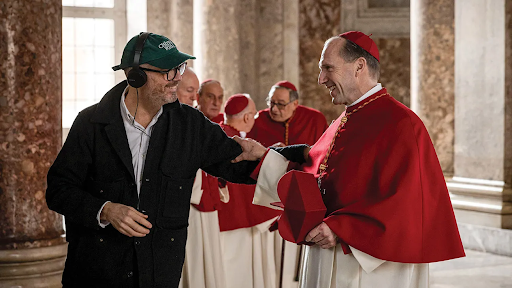I grew up going to church—shout out to Scottsdale Congregational United Church of Christ on Granite Reef and Camelback. The internet will tell you the UCC is a socially liberal mainline Protestant Christian denomination, but in my experience, while some churches within the denomination certainly skewed more traditional Christian, there were just as many that leaned almost more non-denominational (if such a thing could exist under a conventional modern church model). My best friend growing up was, by contrast, Catholic, and while I only tagged along to a handful of church services with him, the formalities and grandeur of the experience were as exhausting as it was imposing—even at a young age before I was aware of the historical and cultural sins of the Catholic faith, it wouldn’t have been shocking to me that over half of US Catholics leave the church at some point. My hippy-dippy denomination voted to be open and affirming in 2000 while the Catholics were actively living out the plot of the movie SPOTLIGHT just a year later…
Still: I’m kinda in the bag for the pope. On my side of the church fence, we didn’t have someone like that. Like, who is that guy? We’re still doing the outfits? The Vatican is kind of a weird place with weird rules, right? He has that car? Even just to consider the sheer fame of it all is… Insane? Like, I still have love for plenty of active ministers in the UCC who I’m distantly in communication with on Facebook, but they would never be the source of inspiration for THE YOUNG POPE. They’re just not that interesting, nor is the religion they’re tethered to even that old (the UCC was only founded in 1957).

Like me, director Edward Berger is also in the bag for the pope, and he understands the violent and complicated historical weight of the church. That position is universally compelling, Catholic or not. His ALL QUIET ON THE WESTERN FRONT follow-up, CONCLAVE, uses that broad curiosity to its advantage. Taking place in the weeks after the current pope died, we become a fly on the wall of a papal conclave organized by the Dean of the College of Cardinals, Cardinal Lawrence (Ralph Fiennes). Four immediate frontrunners for pope emerge immediately, including American progressive liberal Cardinal Bellini (Stanley Tucci), Nigerian conservative Cardinal Adeyemi (Lucian Msamati), established Canadian Cardinal Tremblay (John Lithgow), and Italian traditionalist Cardinal Tedesco (Sergio Castellitto). After an initial vote that sees all four supposed candidates fall well short of the two-thirds majority they’d need to secure the supreme pontiff position, whisper campaigns against certain Cardinals begin to mount—dirt is dug, tea is spilled, secrets are revealed, and spoiler alert, a few of these bastards aren’t gonna be the pope.
Berger is rightly obsessed with this archaic process, but that universal curiosity of what happens behind those closed doors as they wait to send up the white smoke becomes a perfect backdrop for what ultimately amounts to a beautifully filmed episode of THE BACHELORETTE. Every establishing shot is quietly curious about the process—the logistics of feeding 200 or so Cardinals, where and how they’re boarded, how many cigarettes they smoke—but the visual curiosity of this discrete vote is secondary to the petty politicking. Much like a reality show, we’re thrown twist after twist; it’s as though there is a producer in Berger’s ear directing him when to unleash chaos. One by one, he deals massive blows to each candidate—let’s get a surprise Cardinal no one knows about to randomly show up, or for good fun, what if one of the nuns working in the conclave had a hidden child with one of the Cardinals decades prior? Due to the secretive nature of the conclave itself, even if each new bombshell causes a seismic rift between the Cardinals, the reveal of information by the end becomes very one-note; no news is to be coming in or out (in theory) of the conclave during this voting process, and yet Lawrence’s man on the outside is regularly funneling along drama about various candidates in repetitive, singular, and expository fashion.

While there are obvious dramatic stakes to watching flawed men choose a religious leader for 1.39 billion people, that actual process has less social and political foresight than you might imagine. CONCLAVE will likely get put in the uncomfortable position of being framed as Oscar bait, and given the film landscape of 2024, I guess that’s fine. But this is a fun watch with reveals that are so big and silly that you’re meant to gasp alongside your fellow moviegoer in a packed cineplex, not in an arthouse studying its finer messaging—it shouldn’t be mentioned in the same breath as DOUBT or SILENCE, movies actively exploring Catholicism, faith, and the failures of the church therein, but we’ll see that comparative thinkpiece come along soon enough. While each new disqualifying piece of information about the various Cardinals could singularly be construed as some kind of religious commentary-lite—and I’m willing to cede that even within their political alignment, the frontrunners presented within CONCLAVE represent a broad spectrum of the papistry’s modern flaws, obstacles, and weaknesses—you’re trying to outsmart something that itself is playing dumb.
The film’s ending, a final twist I won’t spoil here that lands with very little pretext and ultimately like a dull thud before quickly fading to black, is attempting to not ignore that the rooms where these votes are happening are exclusively filled by men. Berger’s exploration of the sexism within the church is, again, anecdotal: broadly in service of a plot that finds the wickedness of men playing out as an insular game. These narrative reveals are blockbuster fare for a packed audience—how much they’re meant to individually play as critique is irrelevant, undermined by how crowd-pleasing it is to see Fiennes metaphorically stab Lithgow in the back or Tucci frustratedly yell at his peers. This same story could be happening in a bunker during a World War or in a mansion in the hills on Monday nights on ABC and it would feel all the same—there’s a reason this movie has made a handsome 15 million dollars, and it’s not because people want to consider the broader follies of Catholicism or women’s place within it, and that’s okay.















Comments